Academic Integrity, Game Production, and Skill Reflection
VerifiedAdded on 2023/06/11
|12
|2634
|267
Report
AI Summary
This report provides an overview of academic integrity and its significance in higher education, emphasizing the importance of ethical conduct and discipline in academic life. It reflects on the steps taken and difficulties encountered during the production of a game, highlighting challenges in team coordination, resource acquisition, and market feedback. Furthermore, the report discusses the skills acquired throughout the academic year, such as decision-making, leadership, time management, team management, and problem-solving, and their application in the game development process. The conclusion reinforces the importance of academic integrity and disciplinary practices for students to achieve their academic and career goals, while also recognizing the value of skill development in enhancing capabilities and competitiveness.
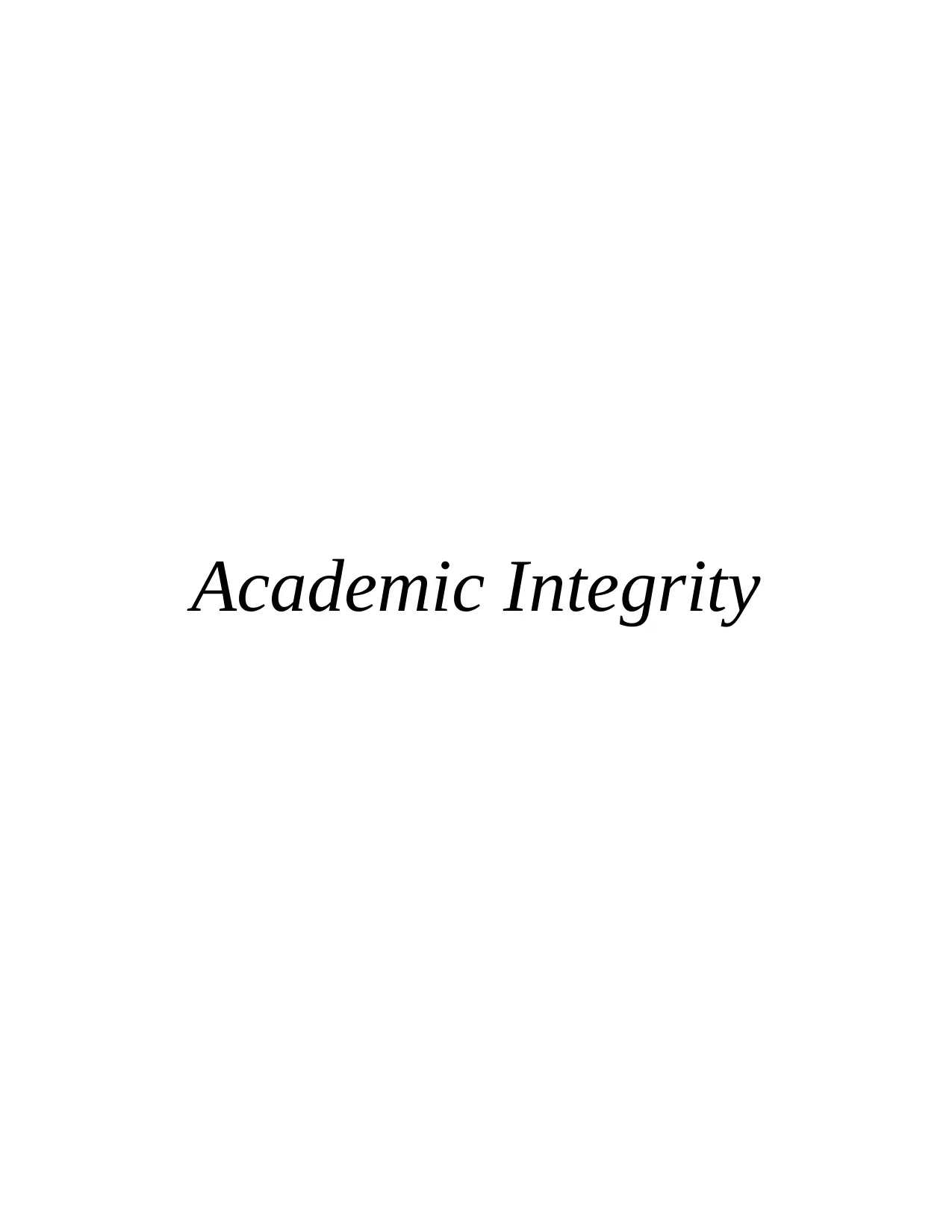
Academic Integrity
Paraphrase This Document
Need a fresh take? Get an instant paraphrase of this document with our AI Paraphraser
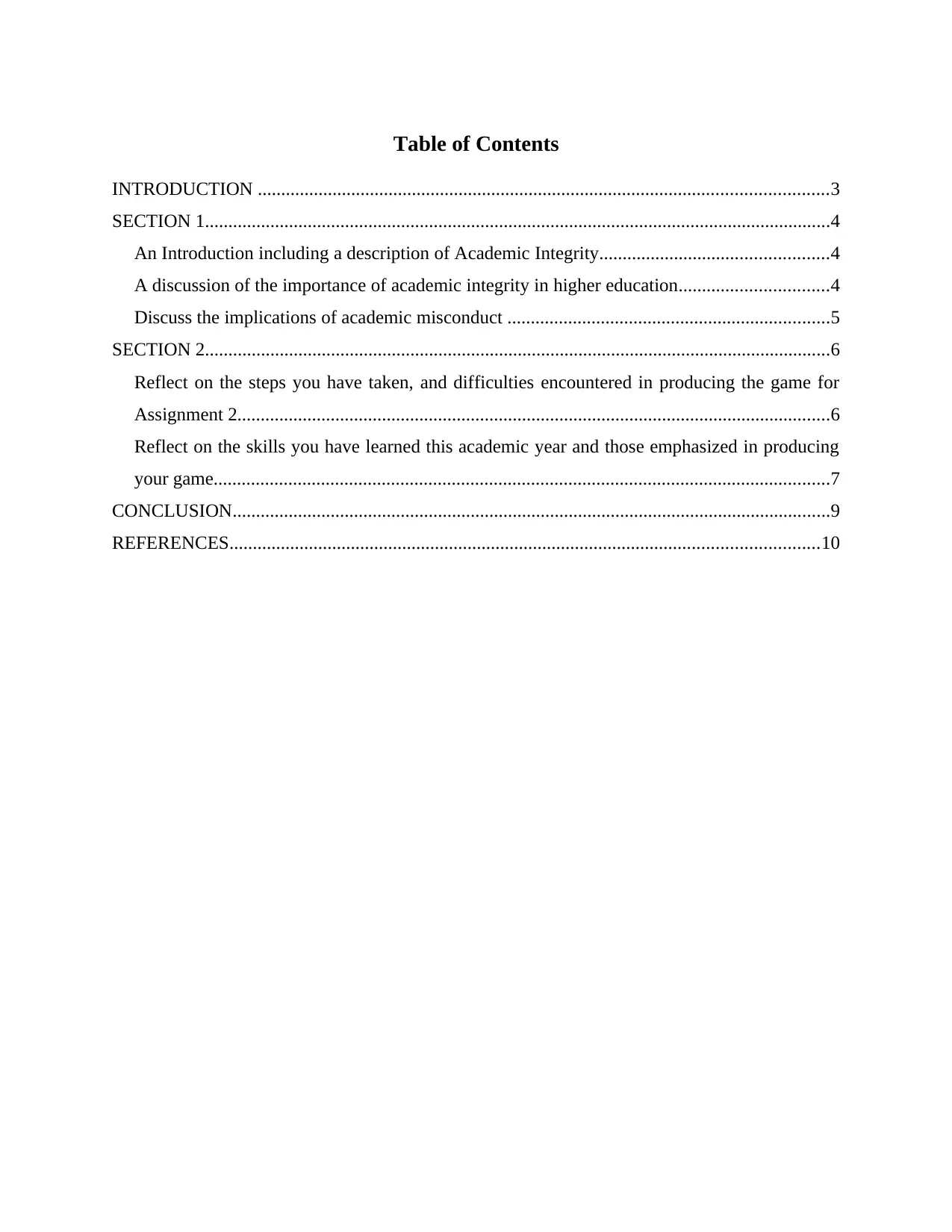
Table of Contents
INTRODUCTION ..........................................................................................................................3
SECTION 1......................................................................................................................................4
An Introduction including a description of Academic Integrity.................................................4
A discussion of the importance of academic integrity in higher education................................4
Discuss the implications of academic misconduct .....................................................................5
SECTION 2......................................................................................................................................6
Reflect on the steps you have taken, and difficulties encountered in producing the game for
Assignment 2...............................................................................................................................6
Reflect on the skills you have learned this academic year and those emphasized in producing
your game....................................................................................................................................7
CONCLUSION................................................................................................................................9
REFERENCES..............................................................................................................................10
INTRODUCTION ..........................................................................................................................3
SECTION 1......................................................................................................................................4
An Introduction including a description of Academic Integrity.................................................4
A discussion of the importance of academic integrity in higher education................................4
Discuss the implications of academic misconduct .....................................................................5
SECTION 2......................................................................................................................................6
Reflect on the steps you have taken, and difficulties encountered in producing the game for
Assignment 2...............................................................................................................................6
Reflect on the skills you have learned this academic year and those emphasized in producing
your game....................................................................................................................................7
CONCLUSION................................................................................................................................9
REFERENCES..............................................................................................................................10
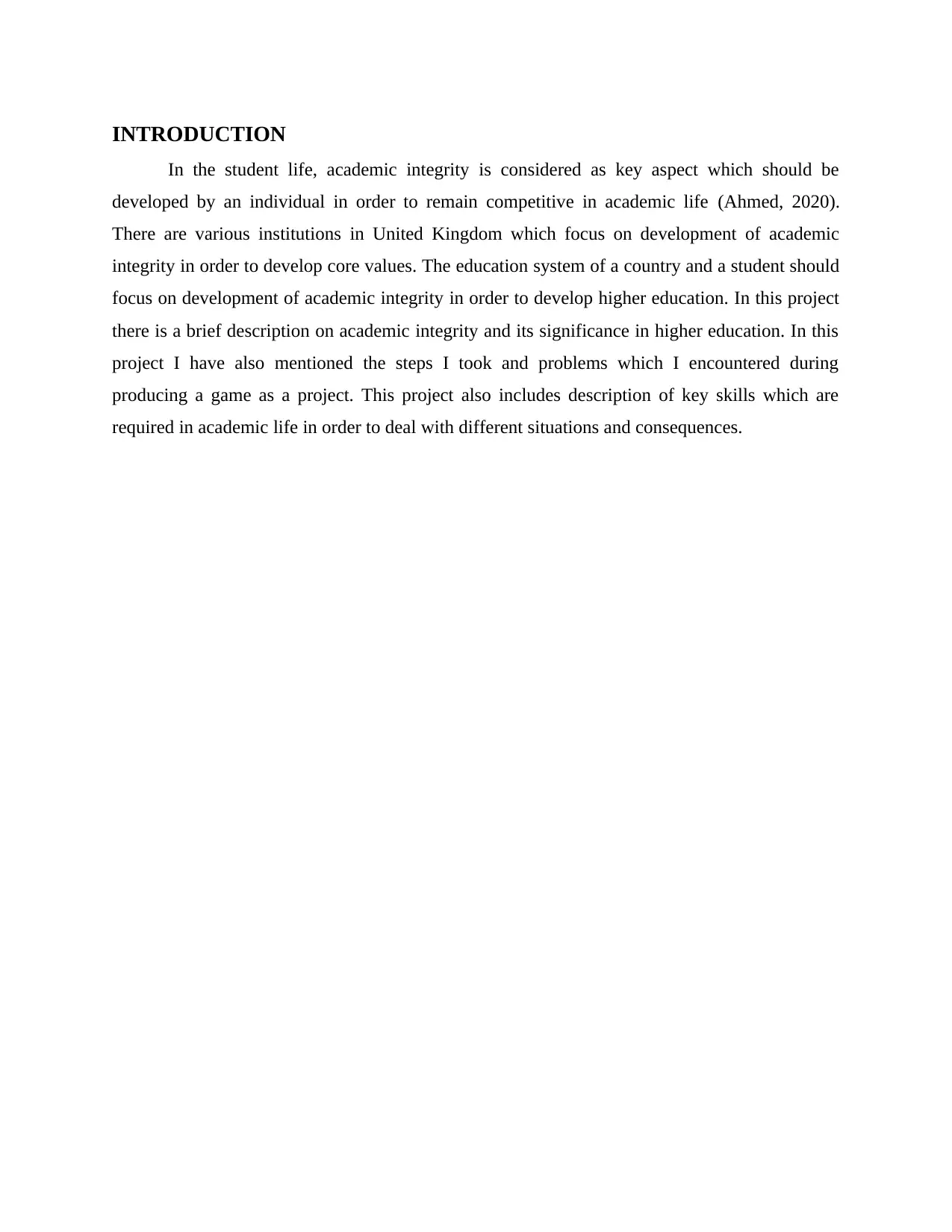
INTRODUCTION
In the student life, academic integrity is considered as key aspect which should be
developed by an individual in order to remain competitive in academic life (Ahmed, 2020).
There are various institutions in United Kingdom which focus on development of academic
integrity in order to develop core values. The education system of a country and a student should
focus on development of academic integrity in order to develop higher education. In this project
there is a brief description on academic integrity and its significance in higher education. In this
project I have also mentioned the steps I took and problems which I encountered during
producing a game as a project. This project also includes description of key skills which are
required in academic life in order to deal with different situations and consequences.
In the student life, academic integrity is considered as key aspect which should be
developed by an individual in order to remain competitive in academic life (Ahmed, 2020).
There are various institutions in United Kingdom which focus on development of academic
integrity in order to develop core values. The education system of a country and a student should
focus on development of academic integrity in order to develop higher education. In this project
there is a brief description on academic integrity and its significance in higher education. In this
project I have also mentioned the steps I took and problems which I encountered during
producing a game as a project. This project also includes description of key skills which are
required in academic life in order to deal with different situations and consequences.
⊘ This is a preview!⊘
Do you want full access?
Subscribe today to unlock all pages.

Trusted by 1+ million students worldwide
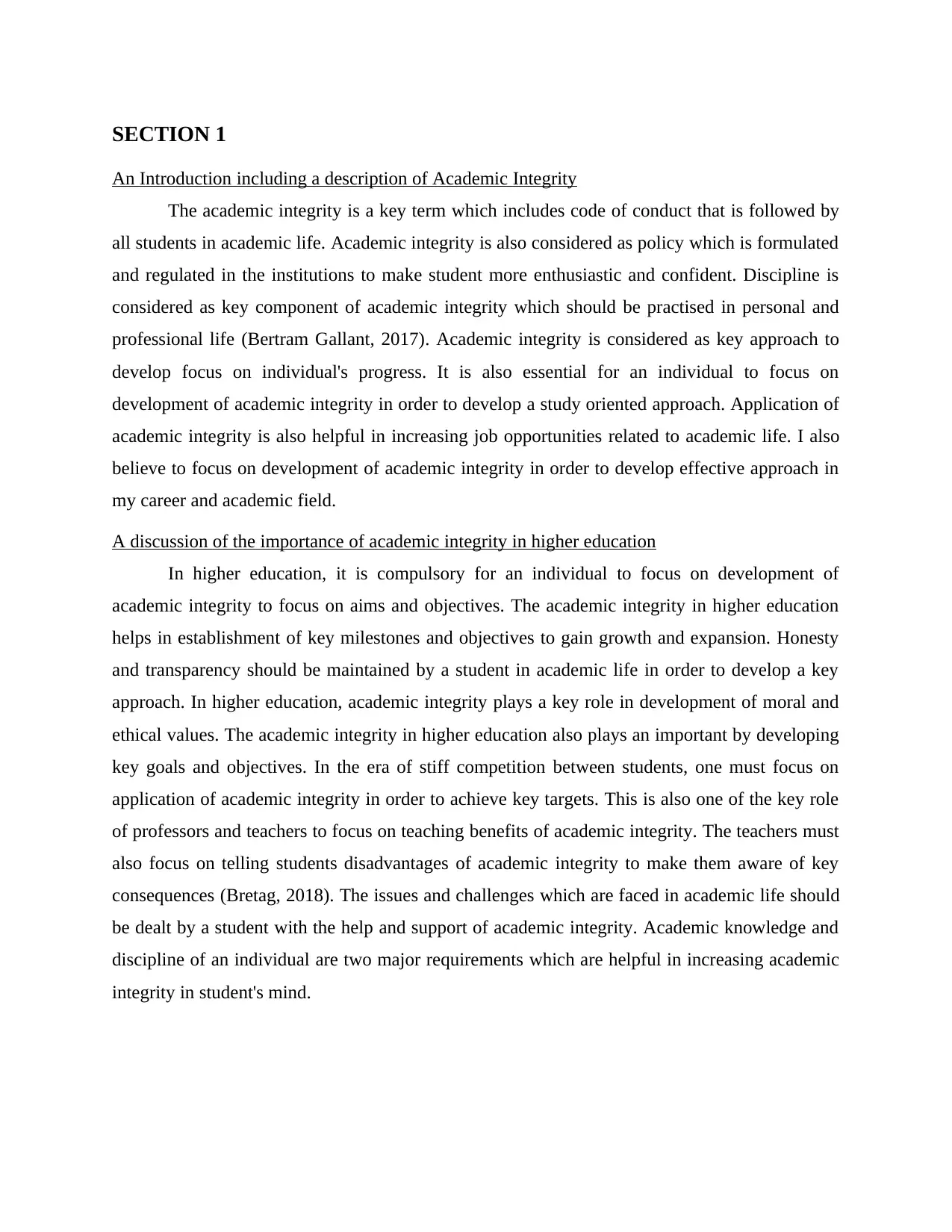
SECTION 1
An Introduction including a description of Academic Integrity
The academic integrity is a key term which includes code of conduct that is followed by
all students in academic life. Academic integrity is also considered as policy which is formulated
and regulated in the institutions to make student more enthusiastic and confident. Discipline is
considered as key component of academic integrity which should be practised in personal and
professional life (Bertram Gallant, 2017). Academic integrity is considered as key approach to
develop focus on individual's progress. It is also essential for an individual to focus on
development of academic integrity in order to develop a study oriented approach. Application of
academic integrity is also helpful in increasing job opportunities related to academic life. I also
believe to focus on development of academic integrity in order to develop effective approach in
my career and academic field.
A discussion of the importance of academic integrity in higher education
In higher education, it is compulsory for an individual to focus on development of
academic integrity to focus on aims and objectives. The academic integrity in higher education
helps in establishment of key milestones and objectives to gain growth and expansion. Honesty
and transparency should be maintained by a student in academic life in order to develop a key
approach. In higher education, academic integrity plays a key role in development of moral and
ethical values. The academic integrity in higher education also plays an important by developing
key goals and objectives. In the era of stiff competition between students, one must focus on
application of academic integrity in order to achieve key targets. This is also one of the key role
of professors and teachers to focus on teaching benefits of academic integrity. The teachers must
also focus on telling students disadvantages of academic integrity to make them aware of key
consequences (Bretag, 2018). The issues and challenges which are faced in academic life should
be dealt by a student with the help and support of academic integrity. Academic knowledge and
discipline of an individual are two major requirements which are helpful in increasing academic
integrity in student's mind.
An Introduction including a description of Academic Integrity
The academic integrity is a key term which includes code of conduct that is followed by
all students in academic life. Academic integrity is also considered as policy which is formulated
and regulated in the institutions to make student more enthusiastic and confident. Discipline is
considered as key component of academic integrity which should be practised in personal and
professional life (Bertram Gallant, 2017). Academic integrity is considered as key approach to
develop focus on individual's progress. It is also essential for an individual to focus on
development of academic integrity in order to develop a study oriented approach. Application of
academic integrity is also helpful in increasing job opportunities related to academic life. I also
believe to focus on development of academic integrity in order to develop effective approach in
my career and academic field.
A discussion of the importance of academic integrity in higher education
In higher education, it is compulsory for an individual to focus on development of
academic integrity to focus on aims and objectives. The academic integrity in higher education
helps in establishment of key milestones and objectives to gain growth and expansion. Honesty
and transparency should be maintained by a student in academic life in order to develop a key
approach. In higher education, academic integrity plays a key role in development of moral and
ethical values. The academic integrity in higher education also plays an important by developing
key goals and objectives. In the era of stiff competition between students, one must focus on
application of academic integrity in order to achieve key targets. This is also one of the key role
of professors and teachers to focus on teaching benefits of academic integrity. The teachers must
also focus on telling students disadvantages of academic integrity to make them aware of key
consequences (Bretag, 2018). The issues and challenges which are faced in academic life should
be dealt by a student with the help and support of academic integrity. Academic knowledge and
discipline of an individual are two major requirements which are helpful in increasing academic
integrity in student's mind.
Paraphrase This Document
Need a fresh take? Get an instant paraphrase of this document with our AI Paraphraser
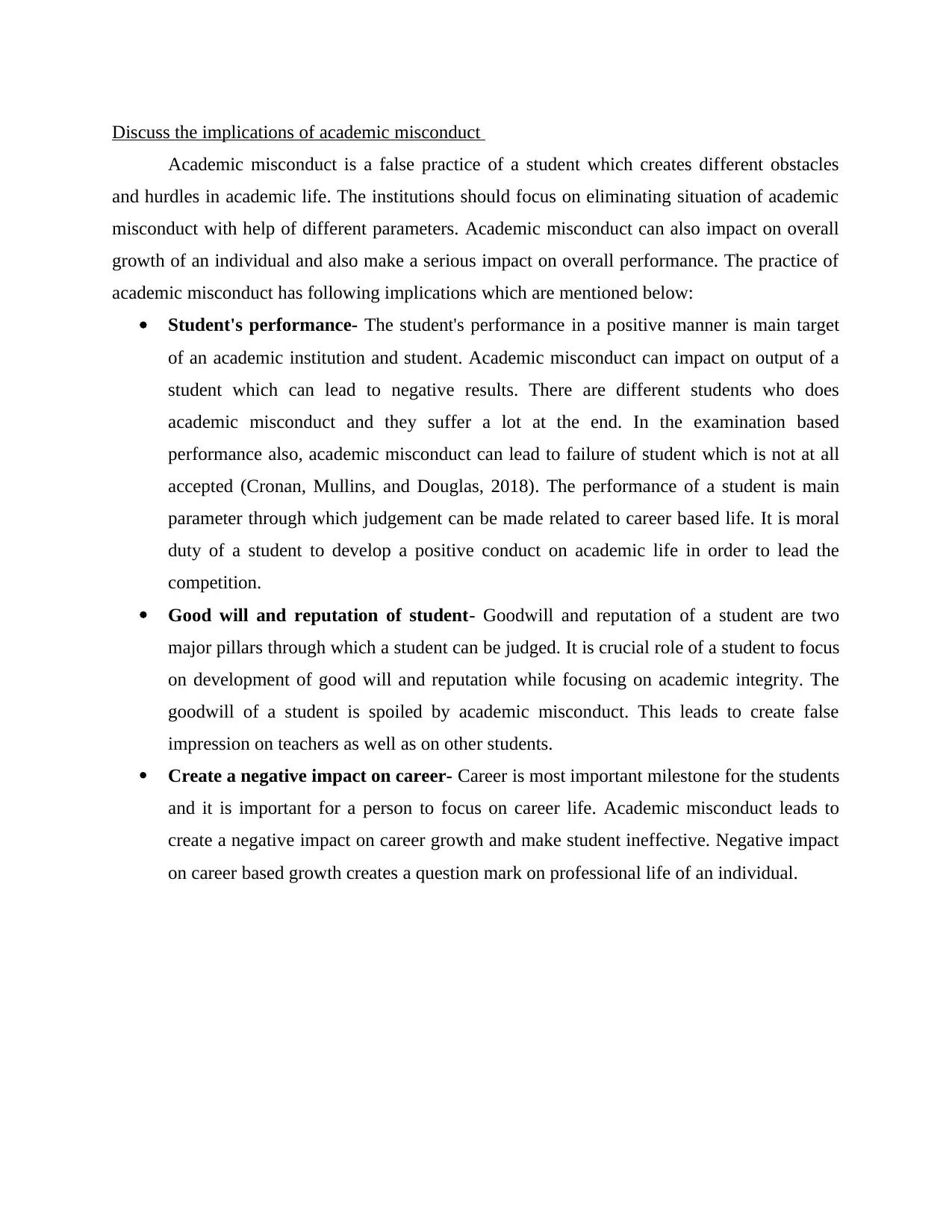
Discuss the implications of academic misconduct
Academic misconduct is a false practice of a student which creates different obstacles
and hurdles in academic life. The institutions should focus on eliminating situation of academic
misconduct with help of different parameters. Academic misconduct can also impact on overall
growth of an individual and also make a serious impact on overall performance. The practice of
academic misconduct has following implications which are mentioned below:
Student's performance- The student's performance in a positive manner is main target
of an academic institution and student. Academic misconduct can impact on output of a
student which can lead to negative results. There are different students who does
academic misconduct and they suffer a lot at the end. In the examination based
performance also, academic misconduct can lead to failure of student which is not at all
accepted (Cronan, Mullins, and Douglas, 2018). The performance of a student is main
parameter through which judgement can be made related to career based life. It is moral
duty of a student to develop a positive conduct on academic life in order to lead the
competition.
Good will and reputation of student- Goodwill and reputation of a student are two
major pillars through which a student can be judged. It is crucial role of a student to focus
on development of good will and reputation while focusing on academic integrity. The
goodwill of a student is spoiled by academic misconduct. This leads to create false
impression on teachers as well as on other students.
Create a negative impact on career- Career is most important milestone for the students
and it is important for a person to focus on career life. Academic misconduct leads to
create a negative impact on career growth and make student ineffective. Negative impact
on career based growth creates a question mark on professional life of an individual.
Academic misconduct is a false practice of a student which creates different obstacles
and hurdles in academic life. The institutions should focus on eliminating situation of academic
misconduct with help of different parameters. Academic misconduct can also impact on overall
growth of an individual and also make a serious impact on overall performance. The practice of
academic misconduct has following implications which are mentioned below:
Student's performance- The student's performance in a positive manner is main target
of an academic institution and student. Academic misconduct can impact on output of a
student which can lead to negative results. There are different students who does
academic misconduct and they suffer a lot at the end. In the examination based
performance also, academic misconduct can lead to failure of student which is not at all
accepted (Cronan, Mullins, and Douglas, 2018). The performance of a student is main
parameter through which judgement can be made related to career based life. It is moral
duty of a student to develop a positive conduct on academic life in order to lead the
competition.
Good will and reputation of student- Goodwill and reputation of a student are two
major pillars through which a student can be judged. It is crucial role of a student to focus
on development of good will and reputation while focusing on academic integrity. The
goodwill of a student is spoiled by academic misconduct. This leads to create false
impression on teachers as well as on other students.
Create a negative impact on career- Career is most important milestone for the students
and it is important for a person to focus on career life. Academic misconduct leads to
create a negative impact on career growth and make student ineffective. Negative impact
on career based growth creates a question mark on professional life of an individual.
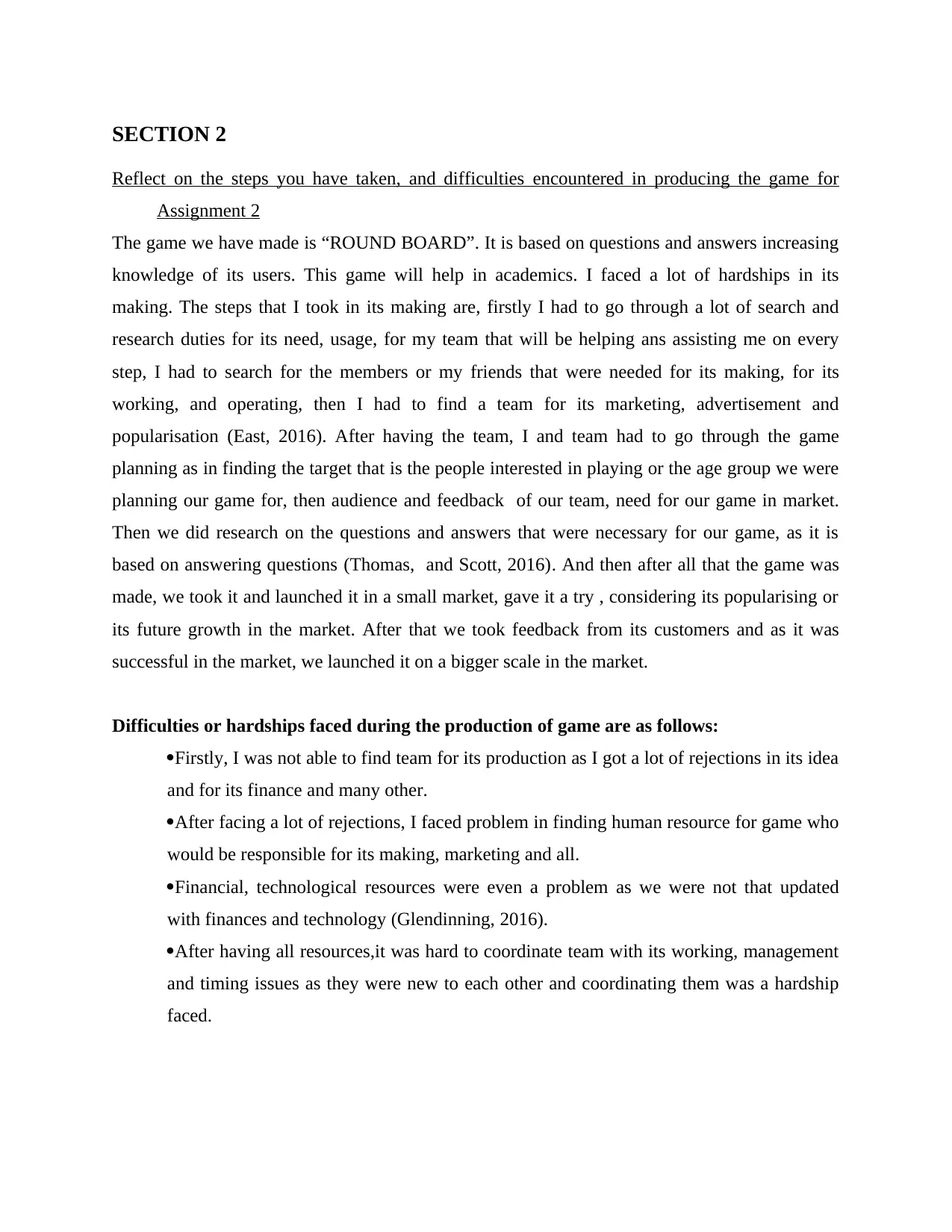
SECTION 2
Reflect on the steps you have taken, and difficulties encountered in producing the game for
Assignment 2
The game we have made is “ROUND BOARD”. It is based on questions and answers increasing
knowledge of its users. This game will help in academics. I faced a lot of hardships in its
making. The steps that I took in its making are, firstly I had to go through a lot of search and
research duties for its need, usage, for my team that will be helping ans assisting me on every
step, I had to search for the members or my friends that were needed for its making, for its
working, and operating, then I had to find a team for its marketing, advertisement and
popularisation (East, 2016). After having the team, I and team had to go through the game
planning as in finding the target that is the people interested in playing or the age group we were
planning our game for, then audience and feedback of our team, need for our game in market.
Then we did research on the questions and answers that were necessary for our game, as it is
based on answering questions (Thomas, and Scott, 2016). And then after all that the game was
made, we took it and launched it in a small market, gave it a try , considering its popularising or
its future growth in the market. After that we took feedback from its customers and as it was
successful in the market, we launched it on a bigger scale in the market.
Difficulties or hardships faced during the production of game are as follows:
Firstly, I was not able to find team for its production as I got a lot of rejections in its idea
and for its finance and many other.
After facing a lot of rejections, I faced problem in finding human resource for game who
would be responsible for its making, marketing and all.
Financial, technological resources were even a problem as we were not that updated
with finances and technology (Glendinning, 2016).
After having all resources,it was hard to coordinate team with its working, management
and timing issues as they were new to each other and coordinating them was a hardship
faced.
Reflect on the steps you have taken, and difficulties encountered in producing the game for
Assignment 2
The game we have made is “ROUND BOARD”. It is based on questions and answers increasing
knowledge of its users. This game will help in academics. I faced a lot of hardships in its
making. The steps that I took in its making are, firstly I had to go through a lot of search and
research duties for its need, usage, for my team that will be helping ans assisting me on every
step, I had to search for the members or my friends that were needed for its making, for its
working, and operating, then I had to find a team for its marketing, advertisement and
popularisation (East, 2016). After having the team, I and team had to go through the game
planning as in finding the target that is the people interested in playing or the age group we were
planning our game for, then audience and feedback of our team, need for our game in market.
Then we did research on the questions and answers that were necessary for our game, as it is
based on answering questions (Thomas, and Scott, 2016). And then after all that the game was
made, we took it and launched it in a small market, gave it a try , considering its popularising or
its future growth in the market. After that we took feedback from its customers and as it was
successful in the market, we launched it on a bigger scale in the market.
Difficulties or hardships faced during the production of game are as follows:
Firstly, I was not able to find team for its production as I got a lot of rejections in its idea
and for its finance and many other.
After facing a lot of rejections, I faced problem in finding human resource for game who
would be responsible for its making, marketing and all.
Financial, technological resources were even a problem as we were not that updated
with finances and technology (Glendinning, 2016).
After having all resources,it was hard to coordinate team with its working, management
and timing issues as they were new to each other and coordinating them was a hardship
faced.
⊘ This is a preview!⊘
Do you want full access?
Subscribe today to unlock all pages.

Trusted by 1+ million students worldwide
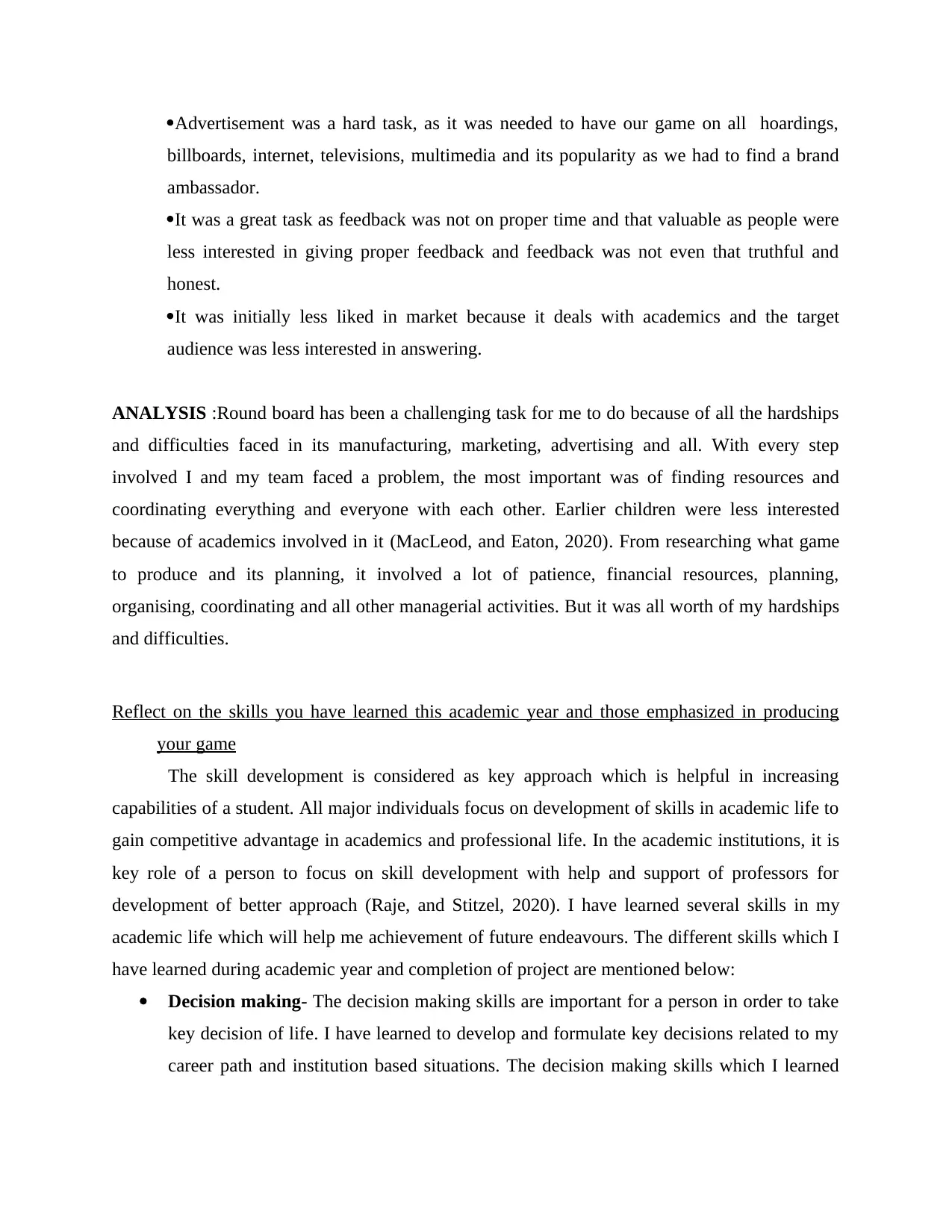
Advertisement was a hard task, as it was needed to have our game on all hoardings,
billboards, internet, televisions, multimedia and its popularity as we had to find a brand
ambassador.
It was a great task as feedback was not on proper time and that valuable as people were
less interested in giving proper feedback and feedback was not even that truthful and
honest.
It was initially less liked in market because it deals with academics and the target
audience was less interested in answering.
ANALYSIS :Round board has been a challenging task for me to do because of all the hardships
and difficulties faced in its manufacturing, marketing, advertising and all. With every step
involved I and my team faced a problem, the most important was of finding resources and
coordinating everything and everyone with each other. Earlier children were less interested
because of academics involved in it (MacLeod, and Eaton, 2020). From researching what game
to produce and its planning, it involved a lot of patience, financial resources, planning,
organising, coordinating and all other managerial activities. But it was all worth of my hardships
and difficulties.
Reflect on the skills you have learned this academic year and those emphasized in producing
your game
The skill development is considered as key approach which is helpful in increasing
capabilities of a student. All major individuals focus on development of skills in academic life to
gain competitive advantage in academics and professional life. In the academic institutions, it is
key role of a person to focus on skill development with help and support of professors for
development of better approach (Raje, and Stitzel, 2020). I have learned several skills in my
academic life which will help me achievement of future endeavours. The different skills which I
have learned during academic year and completion of project are mentioned below:
Decision making- The decision making skills are important for a person in order to take
key decision of life. I have learned to develop and formulate key decisions related to my
career path and institution based situations. The decision making skills which I learned
billboards, internet, televisions, multimedia and its popularity as we had to find a brand
ambassador.
It was a great task as feedback was not on proper time and that valuable as people were
less interested in giving proper feedback and feedback was not even that truthful and
honest.
It was initially less liked in market because it deals with academics and the target
audience was less interested in answering.
ANALYSIS :Round board has been a challenging task for me to do because of all the hardships
and difficulties faced in its manufacturing, marketing, advertising and all. With every step
involved I and my team faced a problem, the most important was of finding resources and
coordinating everything and everyone with each other. Earlier children were less interested
because of academics involved in it (MacLeod, and Eaton, 2020). From researching what game
to produce and its planning, it involved a lot of patience, financial resources, planning,
organising, coordinating and all other managerial activities. But it was all worth of my hardships
and difficulties.
Reflect on the skills you have learned this academic year and those emphasized in producing
your game
The skill development is considered as key approach which is helpful in increasing
capabilities of a student. All major individuals focus on development of skills in academic life to
gain competitive advantage in academics and professional life. In the academic institutions, it is
key role of a person to focus on skill development with help and support of professors for
development of better approach (Raje, and Stitzel, 2020). I have learned several skills in my
academic life which will help me achievement of future endeavours. The different skills which I
have learned during academic year and completion of project are mentioned below:
Decision making- The decision making skills are important for a person in order to take
key decision of life. I have learned to develop and formulate key decisions related to my
career path and institution based situations. The decision making skills which I learned
Paraphrase This Document
Need a fresh take? Get an instant paraphrase of this document with our AI Paraphraser
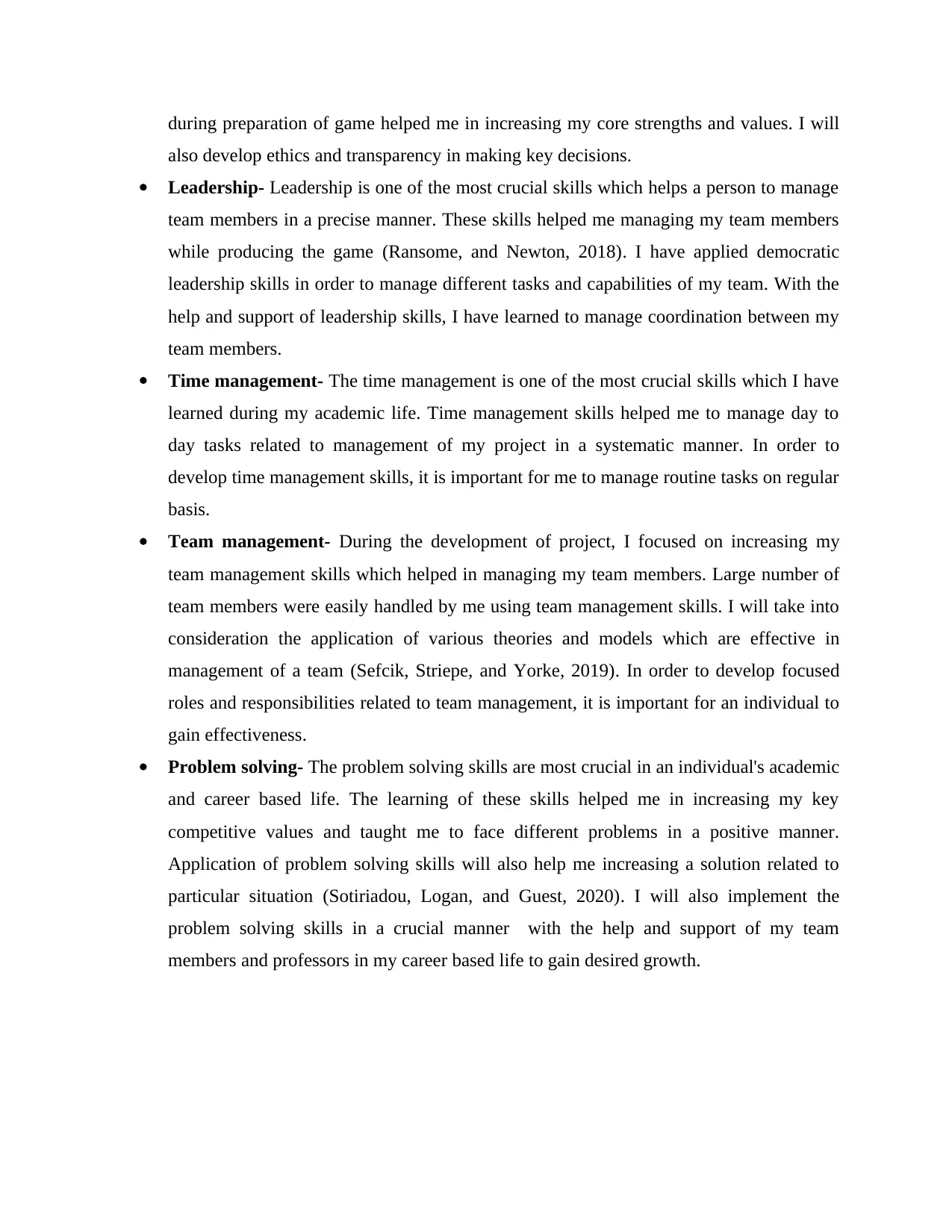
during preparation of game helped me in increasing my core strengths and values. I will
also develop ethics and transparency in making key decisions.
Leadership- Leadership is one of the most crucial skills which helps a person to manage
team members in a precise manner. These skills helped me managing my team members
while producing the game (Ransome, and Newton, 2018). I have applied democratic
leadership skills in order to manage different tasks and capabilities of my team. With the
help and support of leadership skills, I have learned to manage coordination between my
team members.
Time management- The time management is one of the most crucial skills which I have
learned during my academic life. Time management skills helped me to manage day to
day tasks related to management of my project in a systematic manner. In order to
develop time management skills, it is important for me to manage routine tasks on regular
basis.
Team management- During the development of project, I focused on increasing my
team management skills which helped in managing my team members. Large number of
team members were easily handled by me using team management skills. I will take into
consideration the application of various theories and models which are effective in
management of a team (Sefcik, Striepe, and Yorke, 2019). In order to develop focused
roles and responsibilities related to team management, it is important for an individual to
gain effectiveness.
Problem solving- The problem solving skills are most crucial in an individual's academic
and career based life. The learning of these skills helped me in increasing my key
competitive values and taught me to face different problems in a positive manner.
Application of problem solving skills will also help me increasing a solution related to
particular situation (Sotiriadou, Logan, and Guest, 2020). I will also implement the
problem solving skills in a crucial manner with the help and support of my team
members and professors in my career based life to gain desired growth.
also develop ethics and transparency in making key decisions.
Leadership- Leadership is one of the most crucial skills which helps a person to manage
team members in a precise manner. These skills helped me managing my team members
while producing the game (Ransome, and Newton, 2018). I have applied democratic
leadership skills in order to manage different tasks and capabilities of my team. With the
help and support of leadership skills, I have learned to manage coordination between my
team members.
Time management- The time management is one of the most crucial skills which I have
learned during my academic life. Time management skills helped me to manage day to
day tasks related to management of my project in a systematic manner. In order to
develop time management skills, it is important for me to manage routine tasks on regular
basis.
Team management- During the development of project, I focused on increasing my
team management skills which helped in managing my team members. Large number of
team members were easily handled by me using team management skills. I will take into
consideration the application of various theories and models which are effective in
management of a team (Sefcik, Striepe, and Yorke, 2019). In order to develop focused
roles and responsibilities related to team management, it is important for an individual to
gain effectiveness.
Problem solving- The problem solving skills are most crucial in an individual's academic
and career based life. The learning of these skills helped me in increasing my key
competitive values and taught me to face different problems in a positive manner.
Application of problem solving skills will also help me increasing a solution related to
particular situation (Sotiriadou, Logan, and Guest, 2020). I will also implement the
problem solving skills in a crucial manner with the help and support of my team
members and professors in my career based life to gain desired growth.
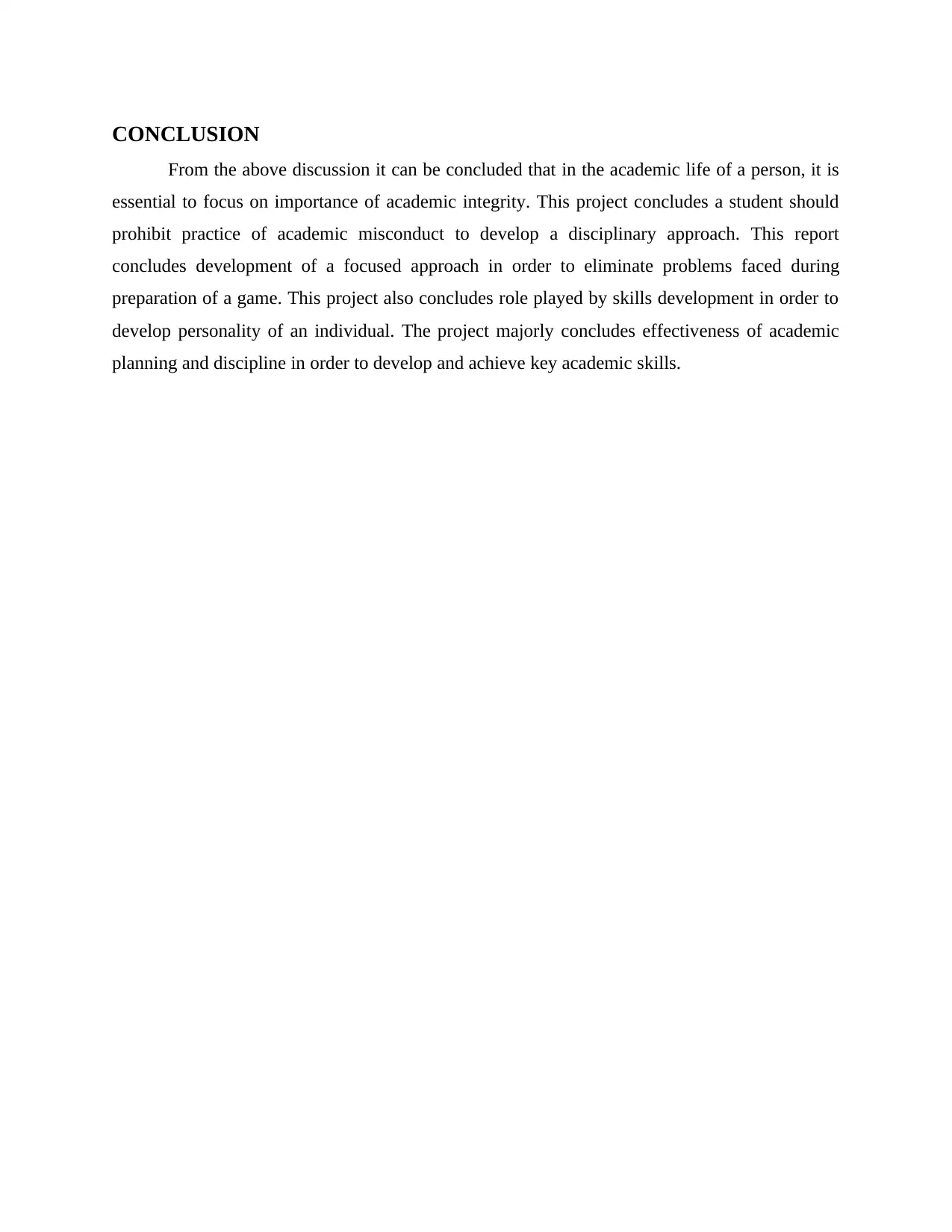
CONCLUSION
From the above discussion it can be concluded that in the academic life of a person, it is
essential to focus on importance of academic integrity. This project concludes a student should
prohibit practice of academic misconduct to develop a disciplinary approach. This report
concludes development of a focused approach in order to eliminate problems faced during
preparation of a game. This project also concludes role played by skills development in order to
develop personality of an individual. The project majorly concludes effectiveness of academic
planning and discipline in order to develop and achieve key academic skills.
From the above discussion it can be concluded that in the academic life of a person, it is
essential to focus on importance of academic integrity. This project concludes a student should
prohibit practice of academic misconduct to develop a disciplinary approach. This report
concludes development of a focused approach in order to eliminate problems faced during
preparation of a game. This project also concludes role played by skills development in order to
develop personality of an individual. The project majorly concludes effectiveness of academic
planning and discipline in order to develop and achieve key academic skills.
⊘ This is a preview!⊘
Do you want full access?
Subscribe today to unlock all pages.

Trusted by 1+ million students worldwide
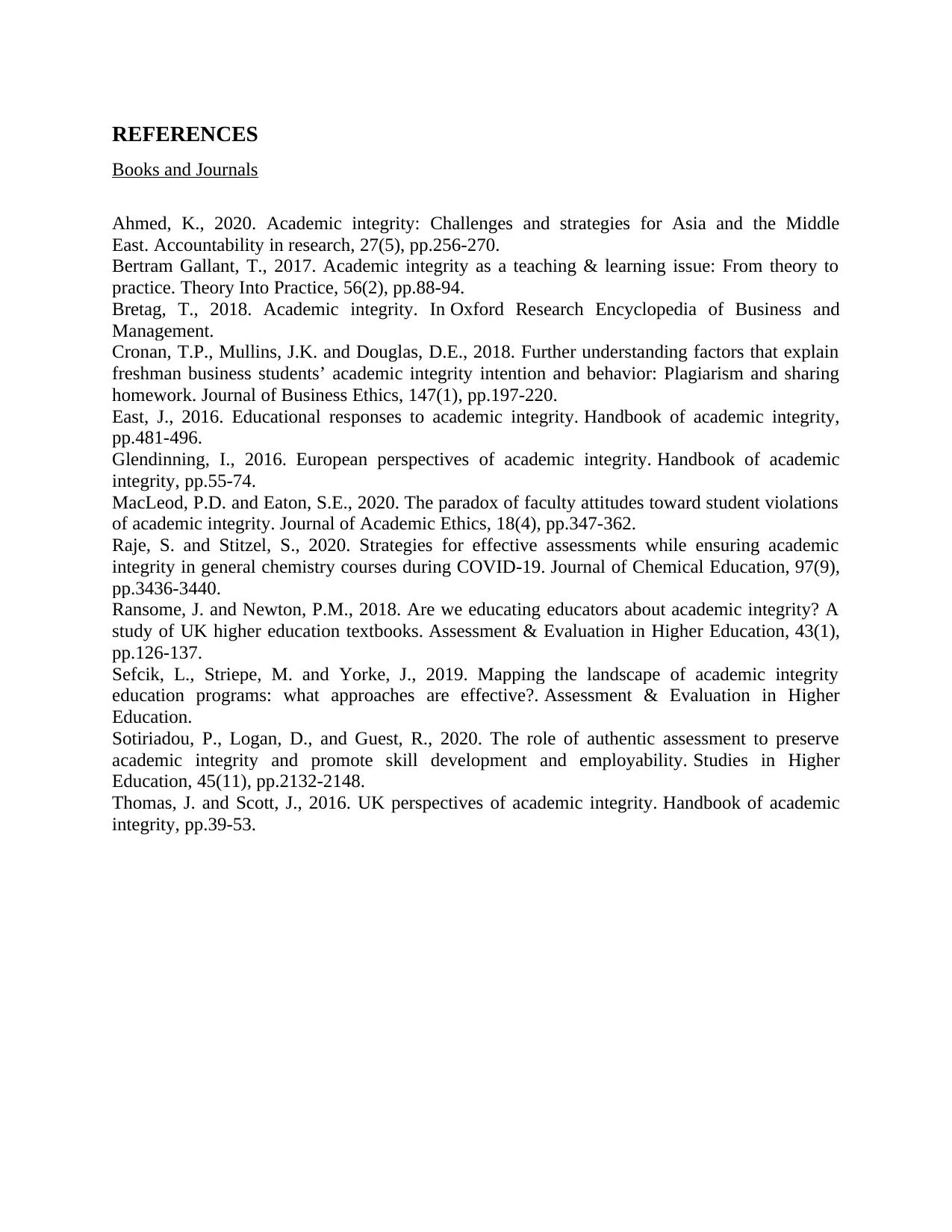
REFERENCES
Books and Journals
Ahmed, K., 2020. Academic integrity: Challenges and strategies for Asia and the Middle
East. Accountability in research, 27(5), pp.256-270.
Bertram Gallant, T., 2017. Academic integrity as a teaching & learning issue: From theory to
practice. Theory Into Practice, 56(2), pp.88-94.
Bretag, T., 2018. Academic integrity. In Oxford Research Encyclopedia of Business and
Management.
Cronan, T.P., Mullins, J.K. and Douglas, D.E., 2018. Further understanding factors that explain
freshman business students’ academic integrity intention and behavior: Plagiarism and sharing
homework. Journal of Business Ethics, 147(1), pp.197-220.
East, J., 2016. Educational responses to academic integrity. Handbook of academic integrity,
pp.481-496.
Glendinning, I., 2016. European perspectives of academic integrity. Handbook of academic
integrity, pp.55-74.
MacLeod, P.D. and Eaton, S.E., 2020. The paradox of faculty attitudes toward student violations
of academic integrity. Journal of Academic Ethics, 18(4), pp.347-362.
Raje, S. and Stitzel, S., 2020. Strategies for effective assessments while ensuring academic
integrity in general chemistry courses during COVID-19. Journal of Chemical Education, 97(9),
pp.3436-3440.
Ransome, J. and Newton, P.M., 2018. Are we educating educators about academic integrity? A
study of UK higher education textbooks. Assessment & Evaluation in Higher Education, 43(1),
pp.126-137.
Sefcik, L., Striepe, M. and Yorke, J., 2019. Mapping the landscape of academic integrity
education programs: what approaches are effective?. Assessment & Evaluation in Higher
Education.
Sotiriadou, P., Logan, D., and Guest, R., 2020. The role of authentic assessment to preserve
academic integrity and promote skill development and employability. Studies in Higher
Education, 45(11), pp.2132-2148.
Thomas, J. and Scott, J., 2016. UK perspectives of academic integrity. Handbook of academic
integrity, pp.39-53.
Books and Journals
Ahmed, K., 2020. Academic integrity: Challenges and strategies for Asia and the Middle
East. Accountability in research, 27(5), pp.256-270.
Bertram Gallant, T., 2017. Academic integrity as a teaching & learning issue: From theory to
practice. Theory Into Practice, 56(2), pp.88-94.
Bretag, T., 2018. Academic integrity. In Oxford Research Encyclopedia of Business and
Management.
Cronan, T.P., Mullins, J.K. and Douglas, D.E., 2018. Further understanding factors that explain
freshman business students’ academic integrity intention and behavior: Plagiarism and sharing
homework. Journal of Business Ethics, 147(1), pp.197-220.
East, J., 2016. Educational responses to academic integrity. Handbook of academic integrity,
pp.481-496.
Glendinning, I., 2016. European perspectives of academic integrity. Handbook of academic
integrity, pp.55-74.
MacLeod, P.D. and Eaton, S.E., 2020. The paradox of faculty attitudes toward student violations
of academic integrity. Journal of Academic Ethics, 18(4), pp.347-362.
Raje, S. and Stitzel, S., 2020. Strategies for effective assessments while ensuring academic
integrity in general chemistry courses during COVID-19. Journal of Chemical Education, 97(9),
pp.3436-3440.
Ransome, J. and Newton, P.M., 2018. Are we educating educators about academic integrity? A
study of UK higher education textbooks. Assessment & Evaluation in Higher Education, 43(1),
pp.126-137.
Sefcik, L., Striepe, M. and Yorke, J., 2019. Mapping the landscape of academic integrity
education programs: what approaches are effective?. Assessment & Evaluation in Higher
Education.
Sotiriadou, P., Logan, D., and Guest, R., 2020. The role of authentic assessment to preserve
academic integrity and promote skill development and employability. Studies in Higher
Education, 45(11), pp.2132-2148.
Thomas, J. and Scott, J., 2016. UK perspectives of academic integrity. Handbook of academic
integrity, pp.39-53.
Paraphrase This Document
Need a fresh take? Get an instant paraphrase of this document with our AI Paraphraser
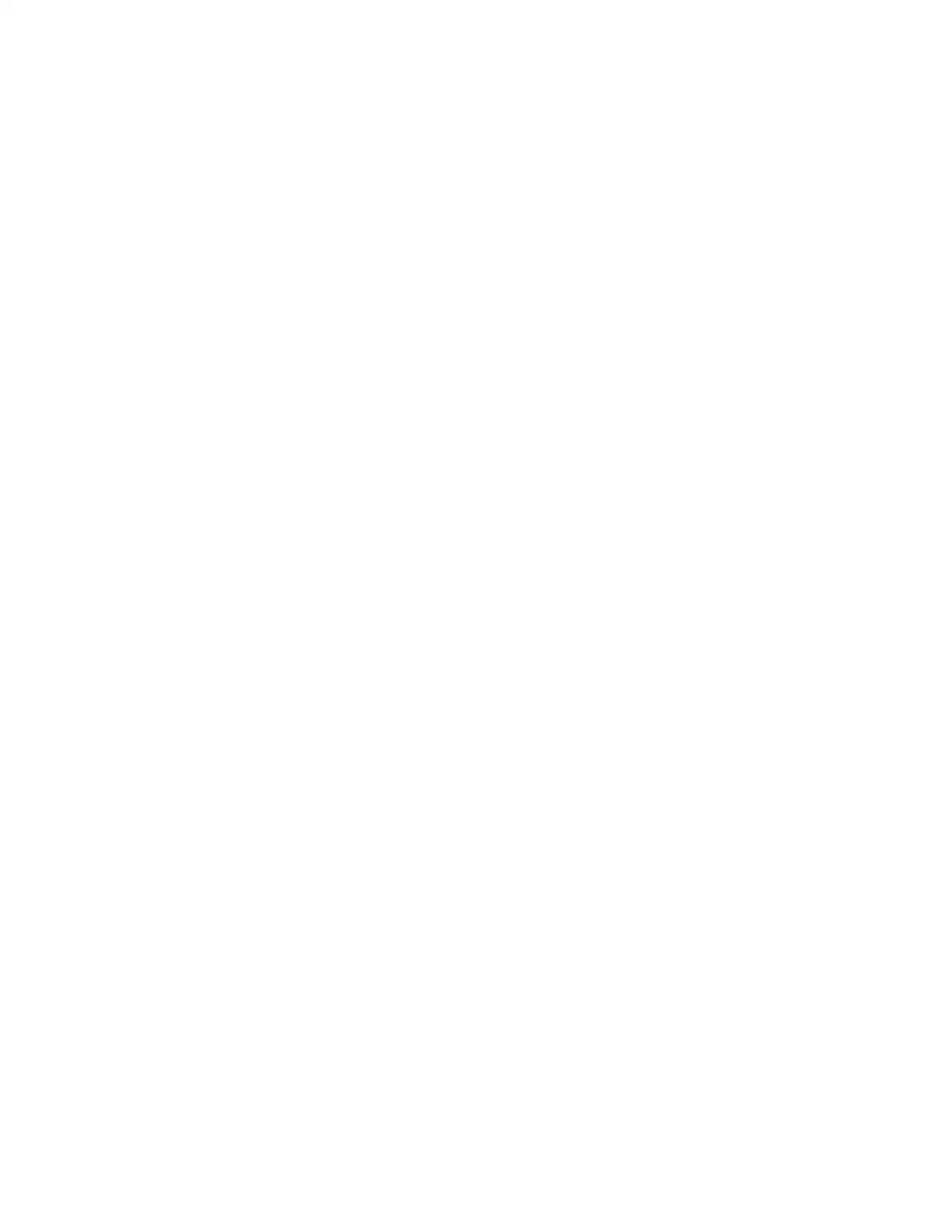
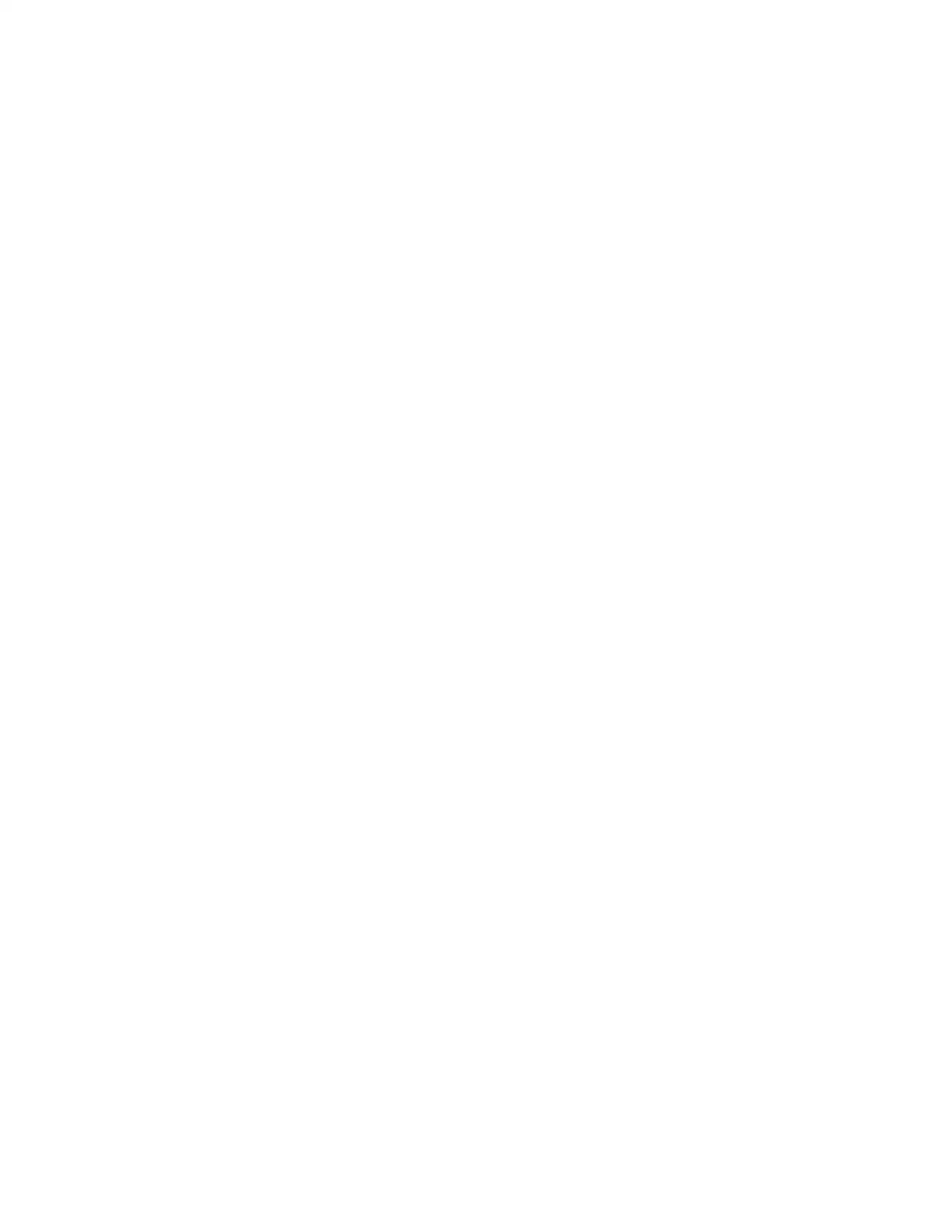
⊘ This is a preview!⊘
Do you want full access?
Subscribe today to unlock all pages.

Trusted by 1+ million students worldwide
1 out of 12
Related Documents
Your All-in-One AI-Powered Toolkit for Academic Success.
+13062052269
info@desklib.com
Available 24*7 on WhatsApp / Email
![[object Object]](/_next/static/media/star-bottom.7253800d.svg)
Unlock your academic potential
Copyright © 2020–2026 A2Z Services. All Rights Reserved. Developed and managed by ZUCOL.


